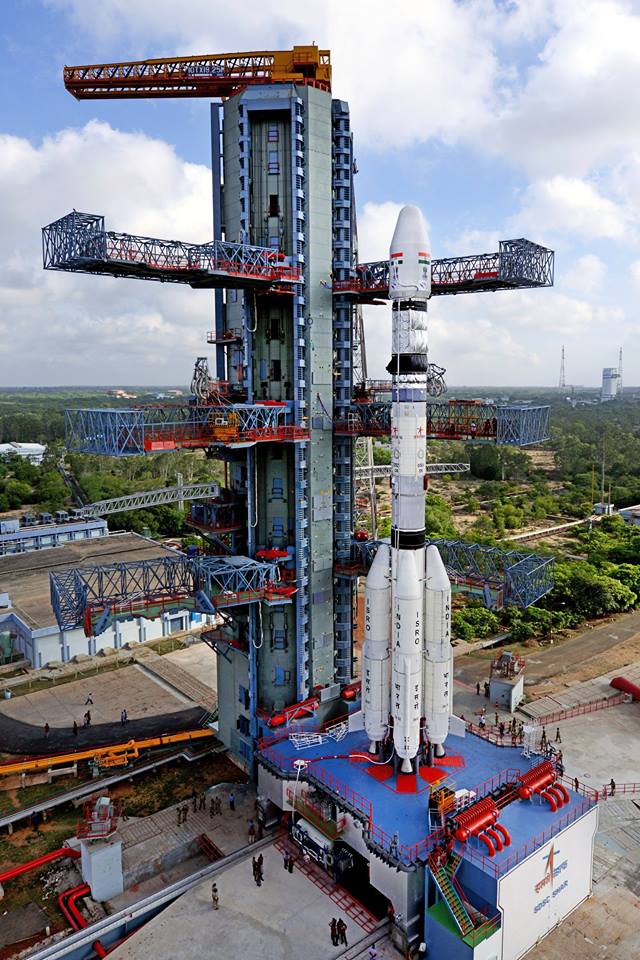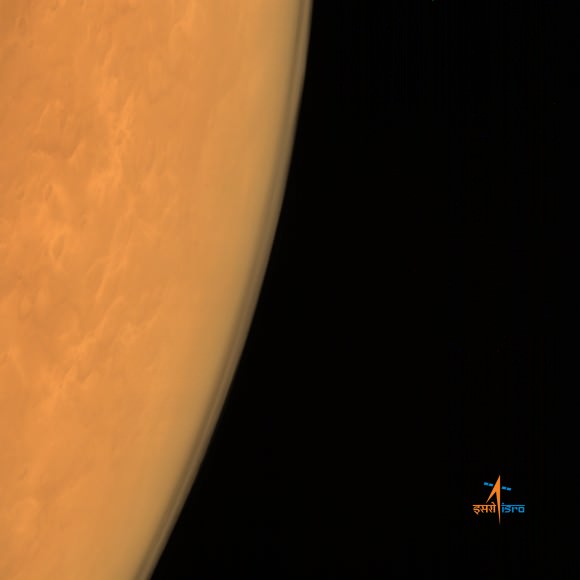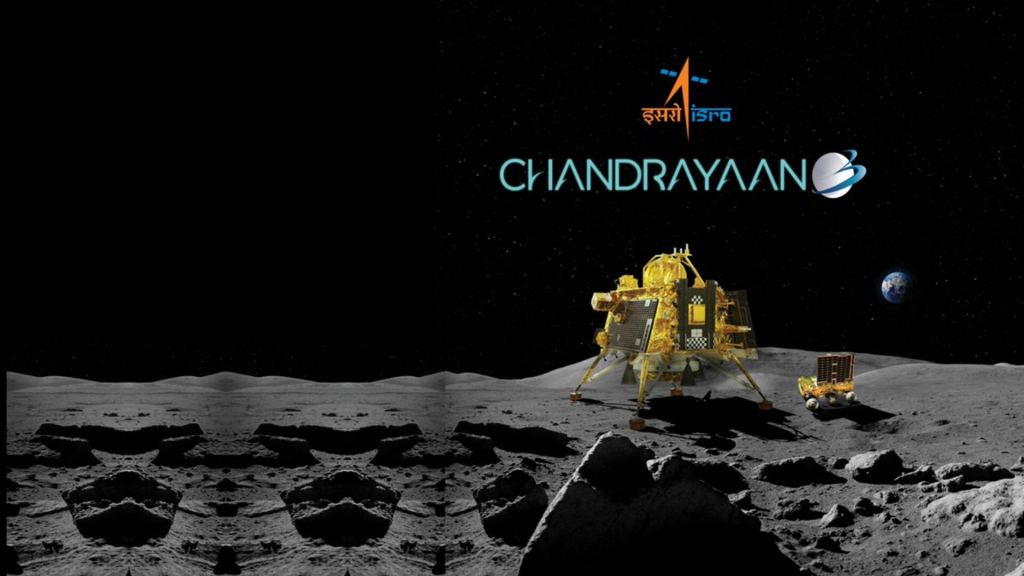

Johns Hopkins University (JHU) continues to pad its space community résumé with their interactive map, “The map of the observable Universe”, that takes viewers on a 13.7-billion-year-old tour of the cosmos from the present to the moments after the Big Bang. While JHU is responsible for creating the site, additional contributions were made by NASA, the European Space Agency, the National Science Foundation, and the Sloan Foundation.
Haslinda Amin reveals the burgeoning role of India's private space firms and their recent advances. Through interviews with leaders and innovators, learn how they are pushing the boundaries of space. “Momentum” takes you on a journey to the frontiers of innovation, uncovering the groundbreaking ideas and inspiring people shaping our future. Join Haslinda Amin as she explores the leading-edge and the invaluable lessons it offers our rapidly evolving world. Watch more episodes of "Momentum": • Momentum with Haslinda Amin #Space #Technology #Bloomberg #India -------- Like this video? Subscribe: Get unlimited access to Bloomberg.com for $1.99/month for the first 3 months: Bloomberg Originals offers bold takes for curious minds on today’s biggest topics. Hosted by experts covering stories you haven’t seen and viewpoints you haven’t heard, you’ll discover cinematic, data-led shows that investigate the intersection of business and culture. Exploring every angle of climate change, technology, finance, sports and beyond, Bloomberg Originals is business as you’ve never seen it. Subscribe for business news, but not as you've known it: exclusive interviews, fascinating profiles, data-driven analysis, and the latest in tech innovation from around the world. Visit our partner channel Bloomberg Quicktake for global news and insight in an instant.
#nasa #space #isro Whatever administration takes over in 2025, they're going to have to deal with the fact that nations like India are succeeding where NASA is failing. How is ISRO doing this on such a tiny budget? #space #nasa #isro Please support my channel! DISCORD MEMBERSHIP, EXCLUSIVE CONTENT AND EARLY RELEASES PLUS 15% OFF MERCH! Support the Angry Astronnaut on patreon Support the Angry Astronnaut on Pay Pal Support the angry astronaut with cash app Follow me on twitter

The Indian Space Research Organisation (#ISRO )the GSLV Mk III launch vehicle�s indigenous cryogenic CE-20 engine at ISRO Propulsion Complex (IPRC)
in Mahendragiri, Tirunelveli district. Ready to Launch.

The Indian Space Research Organisation (#ISRO ) successfully conducted a test on Saturday Mar. 14 2015
to check the GSLV Mk III launch vehicle�s indigenous cryogenic CE-20 engine at ISRO Propulsion Complex (IPRC)
in Mahendragiri, Tirunelveli district. The test is just the latest step toward providing the ISRO with the
capability of sending astronauts to low-Earth orbit (LEO).
THe website of the Indian Space research Orgination
Valles Marinaris and Arsia Mons,

Olympus Mons, Tharsis Bulge trio of volcanoes and Valles Marineris from ISRO’s Mars Orbiter Mission.
Note the clouds and south polar ice cap. Credit: ISRO

Spectacular 3D view of Arsia Mons, a huge volcano on Mars, taken by camera on India’s Mars Orbiter Mission (MOM). Credit: ISRO Story updated with more details and imagery

Pital crater is an impact crater located in Ophir Planum region of Mars,
which is located in the eastern part of Valles Marineris region.
This image is taken by Mars Color Camera (MCC) on 23-04-2015 at a
the largest known canyon in the Solar System.

Three dimensional view of Valles Marineris center portion from India’s MOM Mars Mission. Credit: ISRO
is as much as 600 km wide and measures as much as 7 kilometers (4 mi) deep.

Valles Marineris from India’s Mars Mission. Credit: ISRO

Phobos, one of the two natural satellites of Mars silhouetted against the Martian surface. Credit: ISRO

ISRO’s Mars Orbiter Mission captures spectacular portrait of the Red Planet and swirling dust storms
with the on-board Mars Color Camera from an altitude of 74500 km on Sept. 28, 2014. Credit: ISRO


Image of Tyrrhenus Mons in Hesperia Planum region taken by Mars Color Camera (MCC)
on 25-02-2015 at a spatial resolution of 166m from an altitude of 3192km.
Tyrrhenus Mons is an ancient martian volcano and image shows its timeworn gullies and wind streaks. Credit: ISRO
by KEN KREMER on AUGUST 17, 2015

This view over the Ophir Chasma canyon on the Martian surface was taken by the
Mars Colour Camera aboard India’s Mars Orbiter Mission (MOM).
Ophir Chasma is a canyon in the Coprates quadrangle located at 4° south latitude and 72.5° west longitude.
It is part of the Valles Marineris canyon system. Credit: ISRO

MOM celebrates 1 Year at Mars Olympus Mons, Tharsis Bulge trio of volcanoes and Valles Marineris from ISRO’s Mars Orbiter Mission.
Note the clouds and south polar ice cap. Credit: ISRO
India's Chandrayaan 2 has been orbiting the moon for over a year but hasn't been sharing the data with the world until just before Christmas. I'd been hoping that the high resolution camera would let us see things on the moon in a detail we'd not seen before, but it appears that they've only shared 3 images and 2 of those are blurry. Still I hope this is a start and we'll be seeing more data in the future. Data is available from:
Chandrayaan 2 Mission Loses Contact With Vikram Lander During Descent
Chandrayaan 2 Vikram Landing Site
source: Solar System Exploration Research Virtual Institute The entire world is watching as the Indian space agency is about to attempt the first soft landing in the vicinity of the Moon's south pole. India's Chandrayaan 2 mission will deploy the Vikram lander to a location approximately 70 degrees south in lunar latitude. The planned landing site is a relatively smooth plane between the craters Manzinus C and Simpelius N. Once safely on the ground, the lander will deploy the Pragyan rover to explore this new and fascinating terrain. This visualization was generated using NASA's Moon Trek portal and data from the Lunar Reconnaissance Orbiter's (LRO) Wide Angle Camera (WAC) and Lunar Orbiter Laser Altimeter (LOLA).
India’s Crashed Lander is In This Picture, Somewhere

This image of the lunar highlands is from NASA’s Lunar Reconnaissance Orbiter. You’d need superhuman eyesight to spot it, but India’s crashed Vikram lander is in there somewhere. The lander attempted to land on the Moon on September 6th, but when it was only 2.1 km above the surface, within reach of its objective, ISRO (Indian Space Research Organization) lost contact with the spacecraft.

A screenshot from the LROC Quickmap. Image Credit: NASA/LRO/ASU

Another view of Vikram’s landing site, taken before the spacecraft attempted to land. Manzinus C is in the upper middle of the image and Simpelius N is the small circular crater in the lower middle. This image is 87 kilometers (54 miles) across. Image Credit: NASA/GSFC/Arizona State University

One of the most notable features of the modern space age is the way that new participants are entering the fray. In addition to the traditional contenders – NASA and Roscosmos – China has become a major player in space in recent decades. And in 2022, according tor recent statements, India will join the club too when it becomes the fourth nation to send a crewed mission to space.

ISRO and NASA have inked a deal to collaborate on future missions to jointly explore the Red Planet and our Home Planet hot on the heels of ISRO’s wildly successful Mars Orbiter Mission (MOM), India’s first ever interplanetary voyager to explore Mars.

SRO’s Mars Orbiter Mission captures the limb of Mars with the Mars Color Camera from an altitude of 8449 km soon after achieving orbit on Sept. 23/24, 2014. . Credit: ISRO

MAVEN is NASA’s next Mars orbiter and launched on Nov. 18, 2014, from Cape Canaveral, Florida. It will study the evolution of the Red Planet’s atmosphere and climate. Universe Today visited MAVEN inside the clean room at the Kennedy Space Center. With solar panels unfurled, this is exactly how MAVEN looks when flying through space and circling Mars and observing Comet Siding Spring. Credit: Ken Kremer/kenkremer.com

The Vikram lander with its ramp deployed to show how the rover will roll onto the surface. Credit: ISRO
#chandrayaanlaunch #moonmission #chandrayan3 #chandrayan3 #chandrayaanlaunch #moonmission Chandrayaan-3, the successor to Chandrayaan-2, is scheduled to launch on Friday, 14 July 2023. The Indian Space Research Organisation's (1SRO) Moon mission focuses to put a lander and a rover on the Moon'shighlands. The new mission aims to demonstrate India's capability to safely land and explore the lunar surface. The spacecraft is expected to reach the moon's South Pole and operate for one lunar day, approximately 14 Earth days The new mission aims to demonstrate India's capability to safely land and explore the lunar surface. The spacecraft is expected to reach the moon's South Pole and operate for one lunar day, approximately 14 Earth days.
#chandrayaan3 #ISRO #EnglishNews Chandrayaan 3 Launch Video: Chandrayaan-3 satellite has separated from the rocket and has entered space. ISRO Chief S Somanath wished all the very best for its journey. Mohan Kumar, Mission Kumar added, "pray that it soft lands on the lunar surface". #chandrayaan3 #chandrayaan3launch #ISRO #Sriharikota Connect with us: Facebook: Twitter: Indian Express App: Official Website:
#Chandrayaan3 #Chandrayaan2 #NewsHour Chandrayaan 3 Explained: The moon is not that far! Chandrayaan-3 Mission is scheduled for July 14th and at Indian Express, Monojit Majumdar, National Editor, Explained, The Indian Express Group will be in conversation with Johnson TA, Associate Editor and Amitabh Sinha, Deputy Editor to unravel the mission details- the why, how and the what. Get everything you want to know about this crucial moon mission. #Chandrayaan3 #Chandrayaan #Chandrayaan3LaunchDate #Chandrayaan2. Connect with us: Facebook: Twitter: Indian Express App: Official Website:
#Chandrayaan3 #ISRO #EnglishNews PM Modi On Chandrayaan 3: Prime Minister Narendra Modi talked about Chandrayaan 3 launch. The Indian community applauded when PM Modi said that reverse counting for Chandrayaan 3 launch has started. #Chandrayaan3 #PMModi #Chandrayaan3Launch #ISRO Connect with us: Facebook: Twitter: Indian Express App: Official Website:
#chandrayaan3 #isro #india Chandrayaan-3 is heading steadily towards the moon. The spacecraft reached its highest intended orbit around the Earth. Where it will remain for another few days before embarking on its journey towards the Moon. ISRO successfully completed the fifth & final orbit-raising manoeuvre of the Chandrayaan-3 mission. #chandrayaan3 #isro #india
#Moon #Chandrayaan3 #ISRO Here is how the Lander Imager Camera captured the moon's image just prior to touchdown. Credit: ISRO #Moon #Chandrayaan3 #ISRO
#wsj #india #space India’s Pragyan rover started patrolling the lunar surface, its space agency said on Thursday. The country landed its Chandrayaan-3 spacecraft Wednesday, becoming the first country to land on the moon’s south pole. Photo: Indian Space Research Organisation /AFP/Getty Images #wsj #india #space
BENGALURU Chandrayaan-3 Addressing by Honorable Prime Minister-Live Event ISRO Official youtube channel For more news go to: Follow DW on social media: ►Facebook: ►Twitter: ►Instagram: ►Twitch Für Videos in deutscher Sprache besuchen Sie: Deutsch velle in Deutsch #India #Chandrayan3 #moon
#India #Chandrayan3 #moon The Chandrayan-3 lunar rover has begun exploring the moon's surface, after India became the first country to land a craft near the largely unexplored south pole. Chandrayan-3 sent back images of its six-wheeled, solar-powered rover leaving the craft to conduct experiments for the next two weeks. The mission's success has sparked massive celebrations in India - it's only the fourth country to pull off a soft lunar landing - and for the relatively low cost of around $75-million dollars. India says its next plans are for a crewed mission to the Moon. Subscribe: to Deutschwelle you tube channel

The Indian Space Research Organisation (ISRO) successfully landed its Chandrayaan-3 Lander Module on the surface of the Moon on August 23, 2023. Credit: ISRO

The Vikram lander with its ramp deployed to show how the rover will roll onto the surface. Credit: ISRO
#Voyager #Space Chandrian three marks India's triumphant third lunar voyage, boldly venturing towards the mysterious South Pole of the Moon. This audacious mission is a vital chapter in India's awe-inspiring space odyssey, which embarked on its amusing journey back in nineteen sixty-two with the launch of a humble rocket from the pleasant fishing village of Thumba. Since those modest beginnings, India has extended its divine wings, sending an impressive convoy of satellites, rockets, and scientific probes into the universe.

Chandrayaan-3 propulsion module in front of the Moon. Image credit: ISRO, NASA

A graphic of the Chandrayaan-3 lander separating from the propulsion module. Credit: ISRO.
The ambitious mission is tentatively scheduled for August 26, as per reports. It will be launched using the PSLV rocket from Sriharikota's Sathish Dhawan. ISRO is looking to place spacecraft in a halo orbit around Lagrange point 1 (L1) of the Sun-Earth system. Which is about 1.5 million km from Earth. The objective is to observe solar activities & space weather in real-time without occultation/eclipses. #isro #adityal1 #missiontosun Subscribe to our channel at Check out our website: Connect with us on our social media handles: Facebook: Twitter:
Aditya L1 is the first space-based Indian mission to study the Sun. As part of the mission, the spacecraft will travel about 1.5 million km from the Earth and will then be placed in a halo orbit around the Lagrange point 1 (L1) of the Sun-Earth system. #live #isrolive #adityal1 #live #isro #india #solarmission #sunmission #isrolive #adityal1live #adityal1launchlive #adityal1mission #livenews #sriharikota #spacecenterTimes Subscribe to our channel - Check out our website: : Facebook Twitter: Instagram: You can Search us on YouTube by- live,live news,,english news,times live, live tv, latest news, breaking news, today news, world news, world news live, today world live news , uk news, us news , us news live , russia war news russia news live, ukraine news @timesnow
ISRO is all set to bring in the 2024 new year with the launch of India’s 3rd space observatory. The XPoSat will study X-ray properties from some of the most powerful and high energy sources in the universe. ThePrint’s Sandhya Ramesh explains the mission. Exclusive content, special privileges & more – : Subscribe to ThePrint for Special benefits Connect with ThePrint » Subscribe to ThePrint: » Subscribe to our YouTube Channel: » Like us on Facebook: / theprintindia » Tweet us on Twitter: / theprintindia » Follow us on Instagram: / theprintindia » Find us on LinkedIn : / theprint » Subscribe to ThePrint on Telegram: » Find us on Spotify: » Find us on Apple Podcasts
XPoSat (X-ray Polarimeter Satellite) is India’s first dedicated polarimetry mission to study various dynamics of bright astronomical X-ray sources in extreme conditions. The spacecraft will carry two scientific payloads in a low earth orbit. The primary payload POLIX (Polarimeter Instrument in X-rays) will measure the polarimetry parameters (degree and angle of polarization) in medium X-ray energy range of 8-30 keV photons of astronomical origin. The XSPECT (X-ray Spectroscopy and Timing) payload will give spectroscopic information in the energy range of 0.8-15 keV. Read more Transcript
#GravitasPlus #isro #moonmission From conquering the Moon to studying the Sun up close, India's space agency is set to redefine space exploration. This is what ISRO's visionary roadmap looks like as it aims to unlock the secrets of the universe one mission at a time Join @mollygambhir on #GravitasPlus for more. #isro #moonmission #spaceodyssey About Channel: WION The World is One News examines global issues with in-depth analysis. We provide much more than the news of the day. Our aim is to empower people to explore their world. With our Global headquarters in New Delhi, we bring you news on the hour, by the hour. We deliver information that is not biased. We are journalists who are neutral to the core and non-partisan when it comes to world politics. People are tired of biased reportage and we stand for a globalized united world. So for us, the World is truly One. Subscribe to our channel at Check out our website: Connect with us on our social media handles: Facebook: Twitter:
What is the next space mission that India has planned subsequent to its successful lunar landing? The primary emphasis of this video is to analyse the eight upcoming space missions that are scheduled to be carried out by the Indian Space Research Organisation (ISRO) in the foreseeable future. FAIR-USE COPYRIGHT DISCLAIMER * Copyright Disclaimer under Section 107 of the Copyright Act 1976, allowance is made for "fair use" for purposes such as criticism, commenting, news reporting, teaching, scholarship, and research. Fair use is a use permitted by copyright statute that might otherwise be infringing. Non-profit, educational or personal use tips the balance in favour of fair use. The Buzz does not own the rights to these videos and pictures. They have, in accordance with fair use, been repurposed with the intent of educating and inspiring others. However, if any content owners would like their images removed, please contact us by email at-thebuzz938@gmail.com.
P>
P>
P>
P>
P>